Chinglish中式英语句子
中国式英语(Chinglish)

中国式英语(Chinglish)指中国的英语学习者 和使用者由于受母语的影响和干扰,硬套汉语 规则和习惯,在英语交际中出现的不合规范或 不合英语语言和西方文化习惯的畸形英语。 1. 你的身体很健康。 Your body is very healthy. 2. Teacher Wang 3. 打招呼时: Have you eaten up?
★中国式英语(Chinglish) As the counterpart of translationese, the so-called term Chinglish refers to misshapen, hybrid language that is neither English nor Chinese but that might be described as “English with Chinese characteristics”. Derogatively called in Chinese “pigin”(洋泾浜) in the early and mid-20th century, Chinglish is one of the problems affecting the quality of Chinese-English translation goes here.
The sight of these pictures reminded me of my own childhood.
C. 过多使用修饰词 Unnecessary modifiers 完全征服:completely conquer
conquer conquer不可能是partly,加completely多此一举。 极为可耻:extremely shameless
牛津词典唯一收录的中式英语
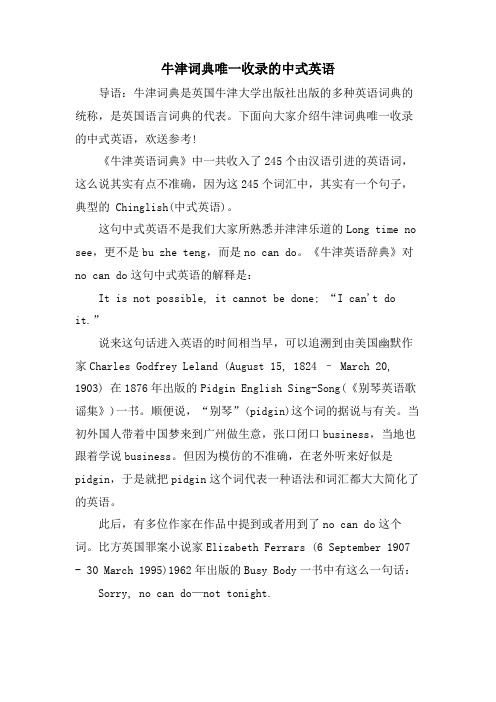
牛津词典唯一收录的中式英语导语:牛津词典是英国牛津大学出版社出版的多种英语词典的统称,是英国语言词典的代表。
下面向大家介绍牛津词典唯一收录的中式英语,欢送参考!《牛津英语词典》中一共收入了245个由汉语引进的英语词,这么说其实有点不准确,因为这245个词汇中,其实有一个句子,典型的 Chinglish(中式英语)。
这句中式英语不是我们大家所熟悉并津津乐道的Long time no see,更不是bu zhe teng,而是no can do。
《牛津英语辞典》对no can do这句中式英语的解释是:It is not possible, it cannot be done; “I can't do it.”说来这句话进入英语的时间相当早,可以追溯到由美国幽默作家Charles Godfrey Leland (August 15, 1824 – March 20, 1903) 在1876年出版的Pidgin English Sing-Song(《别琴英语歌谣集》)一书。
顺便说,“别琴”(pidgin)这个词的据说与有关。
当初外国人带着中国梦来到广州做生意,张口闭口business,当地也跟着学说business。
但因为模仿的不准确,在老外听来好似是pidgin,于是就把pidgin这个词代表一种语法和词汇都大大简化了的英语。
此后,有多位作家在作品中提到或者用到了no can do这个词。
比方英国罪案小说家Elizabeth Ferrars (6 September 1907 - 30 March 1995)1962年出版的Busy Body一书中有这么一句话:Sorry, no can do—not tonight.No can do还有更简洁的形式no can。
林语堂先生在1933年写过一篇In Defense of Pidgin English(为洋泾浜英语辩护)的文章(The China Critic, VI (July 22, 1933), p. 743),其中提到英国作家萧伯纳对洋泾浜英语的评价。
最经典的爆笑中式英语,专门用来搞笑的
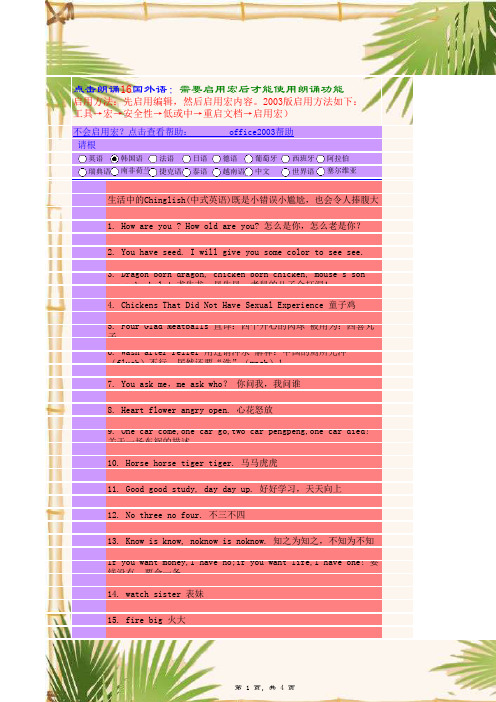
7. You ask me,me ask who? 你问我,我问谁 8. Heart flower angry open. 心花怒放
9. One car come,one car go,two car pengpeng,one car died! 关于一场车祸的描述
德语 越南语
葡萄牙语 西班牙语 阿拉伯语 中文 世界语 塞尔维亚语
瑞典语
南非荷兰语 捷克语
生活中的Chinglish(中式英语)既是小错误小尴尬,也会令人捧腹大笑。
1. How are you ? How old are you? 怎么是你,怎么老是你?
2. You have seed. I will give you some color to see see. Brothers!Together up! 你有种,我要给你点颜色瞧瞧,兄弟们,一起上!
If you want money,I have no;if you want life,I have one! 要钱没有,要命一条
14. watch sister 表妹 15. fire big 火大 16. Go past, no mistake past. 走过路过,不要错过第 1 页,共 2 页
3. Dragon born dragon, chicken born chicken, mouse"s son can make hole! 龙生龙,凤生凤,老鼠的儿子会打洞!
4. Chickens That Did Not Have Sexual Experience 童子鸡
5. Four Glad Meatballs 直译:四个开心的肉球 被用为:四喜丸子
中式英语 Chinglish

3. 你是做什么工作的呢? 你是做什么工作的呢? 误:What's your job? 正:Are you working at the moment? 如今西方世界失业率居高不下,西班牙的失业 率已经高达20%。 如果谈话对象刚刚失业,如此 直接的问法会让对方有失面子,所以要问: Are you working at the moment? (目前您在上班吗?)接下来才问:Where are you working these days?(目前您在哪儿工作呢?)或 者What line of work are you in? (您从事哪个行业 呢?)
5. 现在几点钟了? 现在几点钟了? 误:What time is it now? 正:What time is it, please? 或 What time is it by your watch? What’s the time by your watch? 提示:What time is it now是一个直接从 汉语翻译过的句子,讲英语的时候没有必 要说now,因为不可能问What time was it yesterday?所以符合英语习惯的说法是:请 问现在几点了?
4. 明天我有事情要做。 明天我有事情要做。 误:I will have something to do tomorrow。 正:I will be tied up all day tomorrow. 提示:用I have something to do来表示 很忙,这也完全是中国式的说法。因为每 时每刻我们都有事情要做,躺在那里睡大 觉也是事情。所以可以说我很忙,脱不开 身:I‘m tied up. 还有其它的说法: Sorry, I will be fully occupied I can't make it at that time. I'd love to, but I can't. I have to stay at home.
你说的可能是假英文,老外总结的这些常见中式英文(Chinglish)
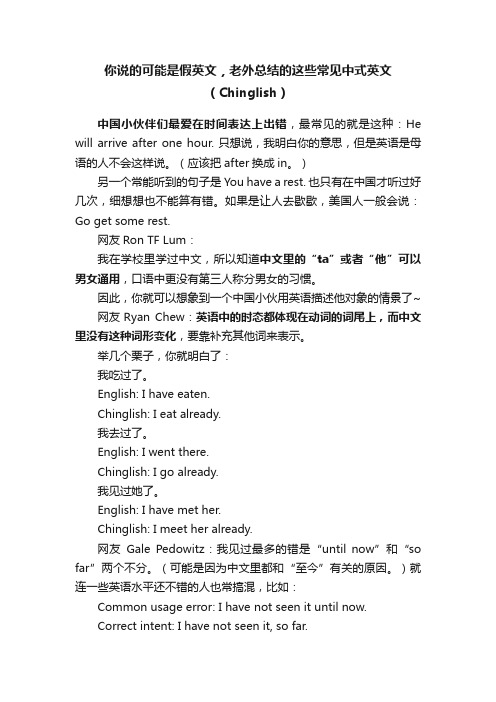
你说的可能是假英文,老外总结的这些常见中式英文(Chinglish)中国小伙伴们最爱在时间表达上出错,最常见的就是这种:He will arrive after one hour. 只想说,我明白你的意思,但是英语是母语的人不会这样说。
(应该把after换成in。
)另一个常能听到的句子是You have a rest. 也只有在中国才听过好几次,细想想也不能算有错。
如果是让人去歇歇,美国人一般会说:Go get some rest.网友Ron TF Lum:我在学校里学过中文,所以知道中文里的“ta”或者“他”可以男女通用,口语中更没有第三人称分男女的习惯。
因此,你就可以想象到一个中国小伙用英语描述他对象的情景了~ 网友Ryan Chew:英语中的时态都体现在动词的词尾上,而中文里没有这种词形变化,要靠补充其他词来表示。
举几个栗子,你就明白了:我吃过了。
English: I have eaten.Chinglish: I eat already.我去过了。
English: I went there.Chinglish: I go already.我见过她了。
English: I have met her.Chinglish: I meet her already.网友Gale Pedowitz:我见过最多的错是“until now”和“so far”两个不分。
(可能是因为中文里都和“至今”有关的原因。
)就连一些英语水平还不错的人也常搞混,比如:Common usage error: I have not seen it until now.Correct intent: I have not seen it, so far.这两种表达的区别就在于,本意是指从来都没见过时用so far;如果用了until now则意思是以前没见过,现在是第一次见。
看完歪果仁的吐槽,是不是感觉自己的英语水平还有上升的空间?憋捉急,刚走出国门的小伙伴,脑子也经常转不过来,总也甩不掉Chinglish,让老外狂晕不止呢↓↓↓下面就是这些Chinglish说法,其中每行第一部分是汉语说法,第二部分是Chinglish说法,第三部分则是英语的标准说法。
Chinglish
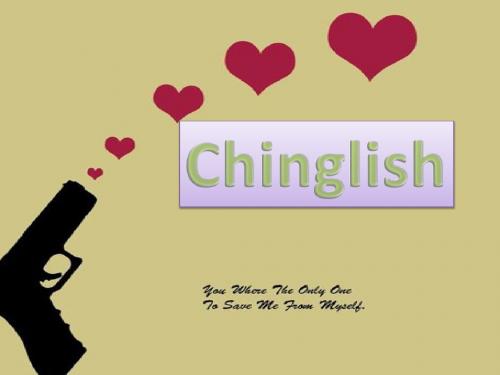
Common chinglish sentences
1.we two who and who? 咱俩谁跟谁? 2.you me you me 彼此彼此。 3. You Give Me Stop! 你给我站住! 4. Heart flower angry open 心花怒放 5. I call Li old big. to year 25. 我叫李老大,今年25。 6. as far as you go to die 有多远,死多远!
When the "habits of mother tongue" encounter "correct English is naturally produced a new kind of Chinglish, I don't know right or not.
People’s attitude towards chinglish
19.I give you face you don`t wanna face,you lose you face ,I turn my face 给你脸你不要脸,你丢脸,我翻脸 20. no three no four 不三不四 21. seven up eight down 七上八下 22.dragon born dragon,chicken born chicken,mouse‘son can make hole!! 龙生龙,凤生凤,老鼠的儿子会打洞! 23.American Chinese not enough 美中不足
the origin of Chinglish
Common chinglish is the birthplace of the Chinese style English in Hong Kong. When British forcibly on Hong Kong island, people deal with foreigner, slowly from the population learn a few simple English words, just learn to use their own way to the English words.
25个被Chinglish毁掉的口语句子
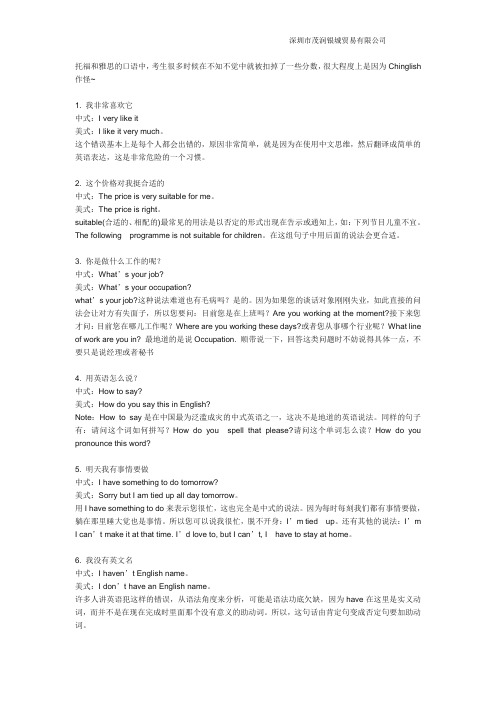
托福和雅思的口语中,考生很多时候在不知不觉中就被扣掉了一些分数,很大程度上是因为Chinglish 作怪~1. 我非常喜欢它中式:I very like it美式:I like it very much。
这个错误基本上是每个人都会出错的,原因非常简单,就是因为在使用中文思维,然后翻译成简单的英语表达,这是非常危险的一个习惯。
2. 这个价格对我挺合适的中式:The price is very suitable for me。
美式:The price is right。
suitable(合适的、相配的)最常见的用法是以否定的形式出现在告示或通知上,如:下列节目儿童不宜。
The following programme is not suitable for children。
在这组句子中用后面的说法会更合适。
3. 你是做什么工作的呢?中式:What’s your job?美式:What’s your occupation?what’s your job?这种说法难道也有毛病吗?是的。
因为如果您的谈话对象刚刚失业,如此直接的问法会让对方有失面子,所以您要问:目前您是在上班吗?Are you working at the moment?接下来您才问:目前您在哪儿工作呢?Where are you working these days?或者您从事哪个行业呢?What line of work are you in? 最地道的是说Occupation. 顺带说一下,回答这类问题时不妨说得具体一点,不要只是说经理或者秘书4. 用英语怎么说?中式:How to say?美式:How do you say this in English?Note:How to say是在中国最为泛滥成灾的中式英语之一,这决不是地道的英语说法。
同样的句子有:请问这个词如何拼写?How do you spell that please?请问这个单词怎么读?How do you pronounce this word?5. 明天我有事情要做中式:I have something to do tomorrow?美式:Sorry but I am tied up all day tomorrow。
50个chinglish的例子

50个chinglish的例子1. "我们要去公园玩儿ball。
"2. "请你帮我个忙,可以open一下电脑吗?"3. "我最近想买个新的手机,你有没有什么recommendations?"4. "你能帮我看看这个cake怎么样吗?"5. "昨天我去了一家新开的餐馆,他们的food很好吃。
"6. "今天天气很好,我们一起去外面take个walk吧。
"7. "我不太会cook,你能教我一些简单的recipes吗?"8. "这件衣服很nice,我很喜欢它的style。
"9. "我觉得我们需要一些新的furniture来装饰房间。
"10. "这双鞋虽然贵一点,但是它的quality很好。
"11. "我昨天去了一趟shopping mall,买了一些新的衣物和accessories。
"12. "我的手机坏了,我需要找个手机修理店帮我repair一下。
"13. "这个电视的画质比较清晰,我很喜欢它。
"14. "我想给我爸爸买个surprise gift,你有什么建议吗?"15. "这个书架上的书太乱了,需要整理一下。
"16. "我现在学习了一些中文单词,但是我还不太会说。
"17. "今天早上我和朋友去了一家新开的咖啡馆,他们的咖啡味道很棒。
"18. "这个电影的情节很有趣,我建议你可以去看一下。
"19. "我们要赶紧打车,不然会迟到的。
"20. "我上个星期去了一趟海滩,那里的海水很清澈。
"21. "我最近开始学习弹吉他,但是还不太熟练。
完整版Chinglish中式英语
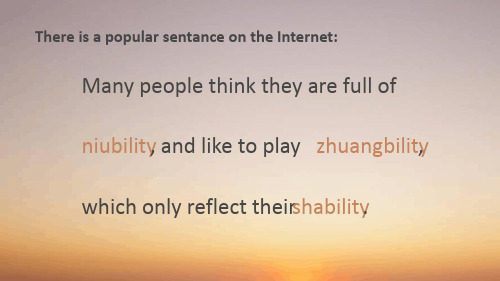
Chinglish has various causes,most commonly incorrtect Chinese dictionaries and translation software .
There is a popular sentance on the Internet:
Many people think they are full of niubility, and like to play zhuangbilit,y which only reflect theirshability.
3
LONG TIME NO SEE
long time no see
I have not seen you for a long time.
பைடு நூலகம்
“InI'Cmhginiveinseg,yito'su vaecrhyacnocemtmo on rf“eodrfeapecemeo”(p挽l.eH回to)owytoaeulvkresare,blwfohaunetdn ywoeu try waonnd'ttrtaankesliat.tYeouthsahtaimnteo English yitocuarsnelsfoaunnddyopureattnyger me.” awkward.Take a look at how one student translated the following:”I give you face,you don't want a face,you lose your face ,I turn my face!”
50个chinglish的例子
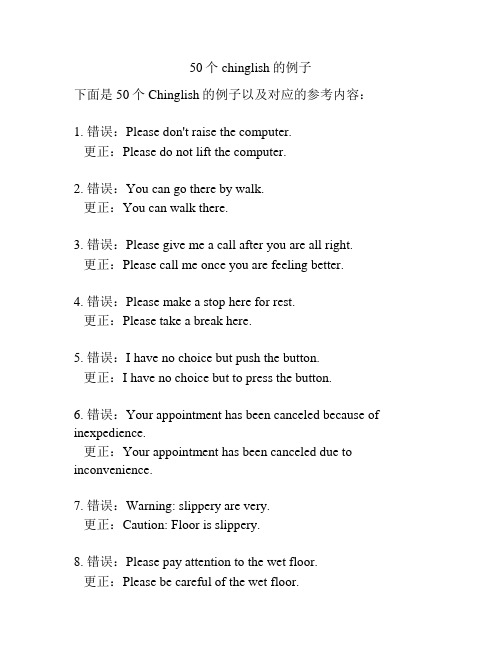
50个chinglish的例子下面是50个Chinglish的例子以及对应的参考内容:1. 错误:Please don't raise the computer.更正:Please do not lift the computer.2. 错误:You can go there by walk.更正:You can walk there.3. 错误:Please give me a call after you are all right.更正:Please call me once you are feeling better.4. 错误:Please make a stop here for rest.更正:Please take a break here.5. 错误:I have no choice but push the button.更正:I have no choice but to press the button.6. 错误:Your appointment has been canceled because of inexpedience.更正:Your appointment has been canceled due to inconvenience.7. 错误:Warning: slippery are very.更正:Caution: Floor is slippery.8. 错误:Please pay attention to the wet floor.更正:Please be careful of the wet floor.9. 错误:Welcome to our hotel. And we hope you will sleep well. 更正:Welcome to our hotel. We hope you have a comfortable stay.10. 错误:I go to work by subway once one day.更正:I take the subway to work every day.11. 错误:The hotel has free wife.更正:The hotel has free Wi-Fi.12. 错误:Please read carefully before you sign the document.更正:Please read the document carefully before signing.13. 错误:You should keep the safety in mind when you travel. 更正:Please keep safety in mind while traveling.14. 错误:Please press the button twice to close the door.更正:Please press the button twice to close the door.15. 错误:The event was held in a high degree of perfection.更正:The event was executed with great precision.16. 错误:Please make sure to take off your coat before entering. 更正:Please remember to take off your coat before entering.17. 错误:This shop sells a wide variety of electronic things.更正:This shop sells a wide variety of electronics.18. 错误:Please keep your eye on your belongings.更正:Please keep an eye on your belongings.19. 错误:Please put up the cautionary electrical fence.更正:Please put up the electric fence as a cautionary measure.20. 错误:Please be aware that falling ice are dangerous.更正:Please be aware that falling ice is dangerous.21. 错误:There is a meeting will be held tomorrow.更正:There will be a meeting tomorrow.22. 错误:The director invites all the staff to a dinner party.更正:The director invites all the staff to a banquet.23. 错误:In China, people eat with chopsticks in every meal.更正:In China, people use chopsticks for every meal.24. 错误:We would like to express our sincere apologize for any inconvenience caused.更正:We would like to express our sincere apologies for any inconvenience caused.25. 错误:Please be kindly to passengers with disabilities.更正:Please be kind to passengers with disabilities.26. 错误:We apologize for any disaster caused.更正:We apologize for any inconvenience caused.27. 错误:Your flight is already keep on hold.更正:Your flight is already on hold.28. 错误:Please remember to bring along your identification cards.更正:Please remember to bring your identification cards.29. 错误:The food in this restaurant tastes very delicacy.更正:The food in this restaurant is very delicious.30. 错误:Please be careful when you cross the bridge.更正:Please exercise caution when crossing the bridge.31. 错误:I'm sorry, but the restroom is under clean now.更正:I'm sorry, but the restroom is currently being cleaned.32. 错误:Please take care of your personal stufs.更正:Please take care of your personal belongings.33. 错误:Would you like to have a cup of warm water?更正:Would you like a cup of hot water?34. 错误:I feel very much happiness to meet you.更正:I am very happy to meet you.35. 错误:Your package is on the way to delivering.更正:Your package is on its way to being delivered.36. 错误:Please keep your valuables unattended.更正:Please do not leave your valuables unattended.37. 错误:The driver will come and pick up you.更正:The driver will come and pick you up.38. 错误:Our company provides a suit of services.更正:Our company provides a variety of services.39. 错误:Please do not remember your password on a public computer.更正:Please do not save your password on a public computer.40. 错误:We appreciate that you cooperate us.更正:We appreciate your cooperation.41. 错误:Please keep silent in the library.更正:Please maintain silence in the library.42. 错误:Please take care of the fire when cooking.更正:Please be cautious with fire when cooking.43. 错误:Please dispose your trash inside the bin.更正:Please dispose of your trash inside the bin.44. 错误:Please pay attention that the elevator is under repair.更正:Please be aware that the elevator is under repair.45. 错误:Please don't make noise during the public transit.更正:Please refrain from making noise during public transit.46. 错误:Please be notice that the exhibit will be closed tomorrow.更正:Please take note that the exhibit will be closed tomorrow.47. 错误:Please excuse me for my no familiar behavior.更正:Please excuse my unfamiliar behavior.48. 错误:Please take off your shoes when you enter the house.更正:Please remove your shoes when you enter the house.49. 错误:Please don't walk on the street.更正:Please do not walk in the street.50. 错误:Please dial the number again after clear up.更正:Please redial the number after hanging up.这些例子展示了Chinglish中常见的错误用法以及如何进行修正。
50个chinglish的例子

50个chinglish的例子Chinglish(中式英语)是指因中文直译或中文表达方式和惯用法被误用而形成的一种中英混合的英语表达方式。
在中国,由于中文和英文的差异,很容易产生Chinglish。
这些Chinglish表达方式在我们使用英语进行沟通时可能会引发误解,给人留下不正式或不专业的印象。
以下是50个例子,用简体中文写。
1.冰箱上贴有标签:"请不要食用冰!"2.商店门口挂着招牌:"衣物在洗涤时请拔去电脑"3.饭店菜单上的一道菜:"炒孜然鸡球摆放在碗中"4.银行柜台的公告:"在结账前,请不要再次提款"5.园区内的标志牌:"请勿在大门口傻笑"6.一张标签:"用油不良会出现火灾,切记施施然"7.一份说明书:"在保持风通和光线扩散的前提下,请关闭窗户和帘子"8.卫生间标志牌:"五分钟内请放心使用,五分钟后请用心使用"9.一瓶饮料的标签:"小心,盖子可扣挂在胃部"10.一份旅游宣传单:"欢迎您参观我们的古老又安全的城市"11.翻译软件的翻译结果:"你的英语之路,积极加油"12.外卖餐厅的菜单:"生煎包(洗下即刻)"13.酒店招牌:"欢迎您进入我们舒适而慷慨的卧室"14.商店售卖的马克杯上印着:"Life will be beatuful"15.餐厅菜单上的一道菜:"肉丝抢炒金针菇"16.一家酒店的宣传口号:"忘掉世界的纷纷扰扰,在我们的奢华酒店中和平酣眠"17.星级酒店的规章制度:"请留下你的酒店加班卡"18.商店门口的广告牌:"每日三点请务必停车"19.一张火车站的指示牌:"请不要迟到,火车会等你"20.旅游景点的导览地图:"忘掉迷路的烦恼,在我们精心设计的迷宫中畅游"21.一份产品说明书:"此产品仅适用于四季度"22.一本英文杂志的标题:"事务所办公司,传出奇闻人事之举"23.一份餐厅菜单:"脆皮烤鸭里包围了一层薄薄的皮,其中鲜嫩多汁的肉散发着美味的气息"24.一位导游的口头禅:"请注意,你们的相机将会在这个地方发疯"25.一份广告:"春节将至,火腿好品牌祝大家春节快乐"26.酒吧的招牌:"玻璃门后面有玻璃杯"27.学校公告:"请不要在校园内长期值班,会生病的"28.一位导游的解说词:"那个时候的皇帝生活富有,吃喝玩乐统统有"29.学校宣传海报:"悬挂我们的校徽,以纪念徽章"30.超市招牌:"商店现正促销,打破商品价格"31.一家医院的公告牌:"为了您的健康着想,请随身携带所有身份证明"32.餐厅的菜单:"小炒面,偷偷炒进了香味"33.一家饭店的规定:"客人离开时请关掉电视,以免床受到损害"34.一份购物广告:"如果您不购买产品,请忽略此广告"35.公园公告牌:"请不要站在树上,否则会导致摔倒"36.一份说明书:"使用前,请先确认使用方法"37.一张火车票:"此票仅适用于火车上的座席"38.酒店的宣传画册:"我们的房间有宽敞的窗户,方便新鲜空气进入"39.超市售卖的柠檬水上贴有标签:"提神醒脑,适合开车路上"40.一份产品说明书:"请妥善保管此说明书,可作为枕头空间使用"41.一家饭店的规定:"烟民须在指定区域喷洒烟蒂"42.一份购物广告:"产品免费赠送给所有购买的顾客"43.一张公园公告牌:"园内的花蔓在特定日期爆发开放,请勿错过"44.学校的考试通知:"请穿好衣服参加考试,不要用内裤"45.公园的宣传单:"来吧,尽情享受河流的新鲜口感"46.商场的广告牌:"购物狂欢节,全场饭楼八折"47.酒店的服务要求:"请您尽情享受我们舒适的床和淋浴"48.一份旅游手册:"这座美丽的城市以其让人难以忘怀的城市风景闻名"49.一家餐厅的菜单:"舒坦滑蛋饭,口感香滑舒服"50.一张机场的标志牌:"巴士停车场再过一百米件航站楼入口"通过以上50个例子,我们可以看到Chinglish常常因为直译、语法错误、用词不准确或者本意不明而产生。
chinglish(中式英文)

你有两下子。
• let the horse come on 放马过来 • you give me stop! 你给我站住! • I give you face you don’t wanna face 给你脸你不要脸 • red face know me
Chinglish
Niubility
Smilence
• we two who and who? 咱俩谁跟谁阿
• how are you ? how old are you? 怎么是你,怎么老是你? • you don’t bird me,I don’t bird you 你不鸟我,我也不鸟 • you have seed ,I will give you some color to see see
你有种,我要给你点颜色看看 你
• Government abuse chicken 宫暴鸡丁 • you give me stop! 你给我站住! • take iron coffee 拿铁咖啡 • American Chinese not enough 美中不足
• Where cool where you stay!哪凉快上哪呆着
红颜知己
• seven up eight down 七上八下
• no three no four 不三不四
• love who who
爱谁谁
• look through autumn water 望穿秋水 • May I borrow your light?
10句很不地道的Chinglish你有吗?
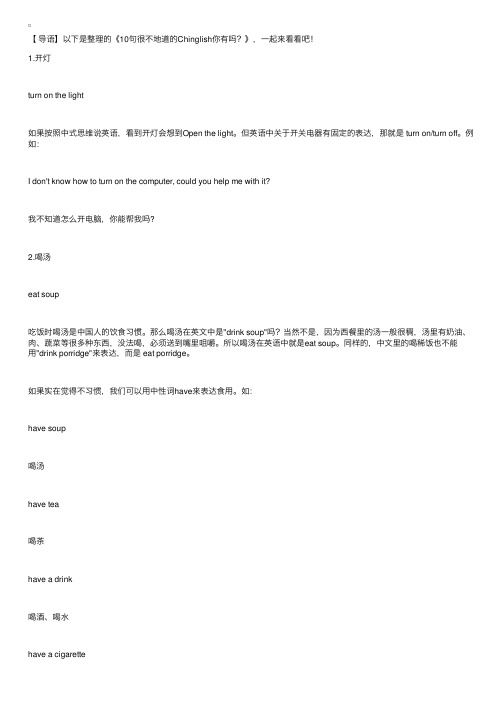
【导语】以下是整理的《10句很不地道的Chinglish你有吗?》,⼀起来看看吧!1.开灯turn on the light如果按照中式思维说英语,看到开灯会想到Open the light。
但英语中关于开关电器有固定的表达,那就是 turn on/turn off。
例如:I don't know how to turn on the computer, could you help me with it?我不知道怎么开电脑,你能帮我吗?2.喝汤eat soup吃饭时喝汤是中国⼈的饮⾷习惯。
那么喝汤在英⽂中是"drink soup"吗?当然不是,因为西餐⾥的汤⼀般很稠,汤⾥有奶油、⾁、蔬菜等很多种东西,没法喝,必须送到嘴⾥咀嚼。
所以喝汤在英语中就是eat soup。
同样的,中⽂⾥的喝稀饭也不能⽤"drink porridge"来表达,⽽是 eat porridge。
如果实在觉得不习惯,我们可以⽤中性词have来表达⾷⽤。
如:have soup喝汤have tea喝茶have a drink喝酒、喝⽔have a cigarette抽烟、吸烟have a candy吃糖have an apple吃个苹果have fish吃鱼3.吃药take medicine看到这⾥,还能认为吃药是"eat medicine"吗,因为英⽂中的eat,通常含有咀嚼的意味,但是我们很少会咀嚼药品,所以吃药的地道表达是take medicine。
如:A:I had a cold.B:No need to take medicine for this illness, with a couple of days of rest you'll be all right.A:我感冒了。
B: 这病不⽤吃药,休息⼀两天⾃然会好的。
当然了,我们这⾥⽤have medicine这个中性词表达也可以。
50个chinglish的例子
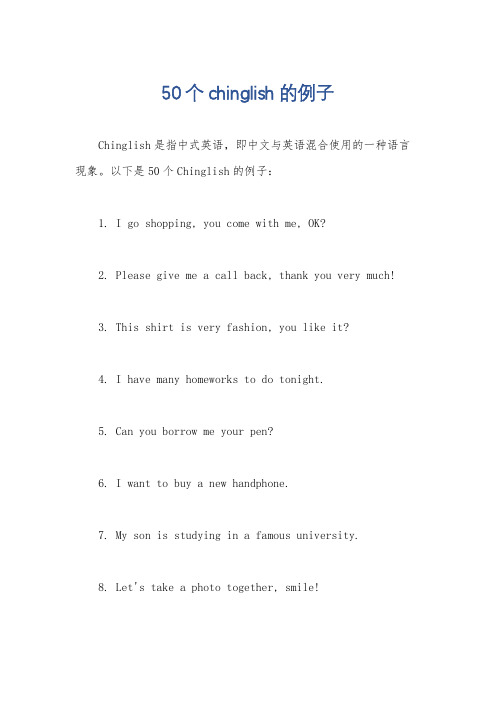
50个chinglish的例子Chinglish是指中式英语,即中文与英语混合使用的一种语言现象。
以下是50个Chinglish的例子:1. I go shopping, you come with me, OK?2. Please give me a call back, thank you very much!3. This shirt is very fashion, you like it?4. I have many homeworks to do tonight.5. Can you borrow me your pen?6. I want to buy a new handphone.7. My son is studying in a famous university.8. Let's take a photo together, smile!9. I have a big stomachache, I need to see a doctor.10. The weather is too hot, I want to drink a glass of ice water.11. I like to eat spicy food, it makes me feel very exciting.12. I have a lot of pressures at work recently.13. You are so clever, can you teach me this math problem?14. My father is a businessman, he travels a lot.15. I will go to supermarket to buy some vegetables and fruits.16. I am very tired today, I want to have a good rest.17. Can you help me to open the TV? It is not working.18. I need to go to the bank to withdraw some money.19. I have a lot of things to do, I am very busy.20. I want to buy a new dress for the party, can you give me some suggestions?21. Please give me a hand, I cannot carry this heavy box.22. I have a bad cold, I need to take some medicine.23. Can you tell me how to use this washing machine?24. My friend is a famous singer, I am very proud of her.25. I want to go to the park to take a walk, do you want to come together?26. I have a lot of dreams, I want to make them come true.27. I need to go to the airport to pick up my cousin.28. My mother is a good cooker, she can make delicious food.29. I am very hungry, let's go to have a big meal.30. I want to buy a new car, but it is too expensive.31. I have a lot of friends, we often have parties together.32. Can you help me to find my glasses? I cannot see clearly.33. I need to go to the post office to send a package.34. I have a lot of hobbies, such as singing and dancing.35. I have a lot of books, I like to read them in myfree time.36. I want to go to the cinema to watch a movie, do you have any recommendations?37. My sister is a good painter, her paintings are very beautiful.38. I need to go to the gym to do some exercises.39. Can you lend me some money? I will pay you back next week.40. I want to buy a new computer, can you help me to choose one?41. I have a lot of clothes, I need to clean up my wardrobe.42. I want to learn how to play the guitar, it is my dream.43. I have a lot of problems, I don't know how to solve them.44. Can you give me a hand? I cannot carry this heavy bag.45. I need to go to the library to borrow some books.46. I have a lot of dreams, I want to achieve them one by one.47. I want to buy a new phone, but I don't have enough money.48. I have a lot of plans for the weekend, I want to have fun.49. Can you help me to fix my bike? It is broken.50. I need to go to the supermarket to buy some groceries.。
Chinglish 中式英语大全
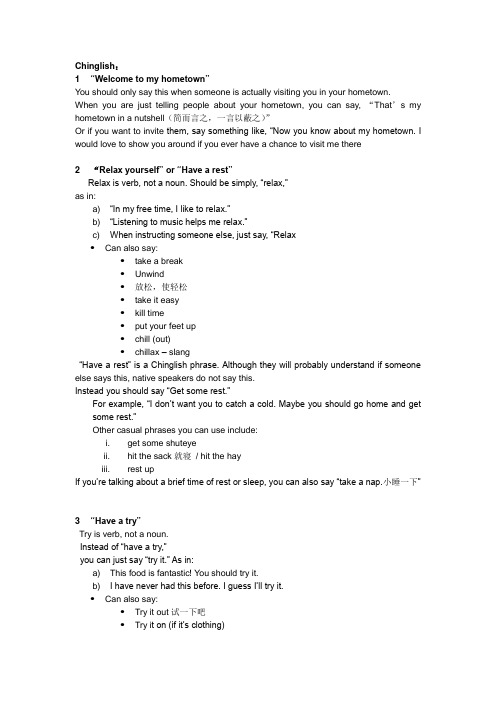
Chinglish:1 “Welcome to my hometown”You should only say this when someone is actually visiting you in your hometown.When you are just telling people about your hometown, you can say, “That’s my hometown in a nutshell(简而言之,一言以蔽之)”Or if you want to invite them, say something like, “Now you know about my hometown. I would love to show you around if you ever have a chance to visit me there2 “Relax yourself” or“Have a rest”Relax is verb, not a noun. Should be simply, “relax,”as in:a) “In my free time, I like to relax.”b) “Listening to music helps me relax.”c) When instructing someone else, just say, “RelaxCan also say:take a breakUnwind放松,使轻松take it easykill timeput your feet upchill (out)chillax – slang“Have a rest” is a Chinglish phrase. Although they will probably understand if someone else says this, native speakers do not say this.Instead you should say “Get some rest.”For example, “I don’t want you to catch a cold. Maybe you should go home and get some rest.”Other casual phrases you can use include:i. get some shuteyeii. hit the sack就寝/ hit the hayiii. rest upIf you’re talking about a brief time of rest or sleep, you can also say “take a nap.小睡一下”3 “Have a try”Try is verb, not a noun.Instead of “have a try,”you can just say “try it.” As in:a) This food is fantastic! You should try it.b) I have never had this before. I guess I’ll try it.Can also say:Try it out试一下吧Try i t on (if it’s clothing)Try thisTry my…Try the…Give it a shot.Popular phrase,“I’ll try anything once”4 “In a word”“In a word” actually means that you will sum概括something up in one word.a) For example, “That movie was, in a word, incredible.”Instead, you can say:to sum up总之in conclusion最后,综上所述simply putin simple termsbasicallyin a nutshell5 How to pronounce:“Famous”“Campus”“Delicious”a) None of these words have an “r” anywhere in them.Be careful not to add an “r” sound to a simple “us.”“Delicious” is a great word, but it’s important to remember that it’s not the ONLY word that can describe food.Alternatives供选方案to Delicious:tastyMouthwatering令人垂涎的Appetizing开胃的诱人是Flavorful可口的Succulent汁多味美的Scrumptious美味的“delish”yummyfinger-lickingamazing6 “Daily Life”“Lover” and “Play”The phrase “daily life” is not technically incorrect. However, it is an unusual phrase, and it sounds stilted 不自然的(unnaturally formal or strange) to native speakers.Instead of “in my daily life”you can say “on a daily basis.”As in:a) Sometimes I like to attend formal dinners but not on a daily basis.b) It’s good for you to practice speaking English on a daily basis.You can also say:On a day-to-day basisEvery dayRegularlyUsuallyGenerallyGenerally-speakingIn most situationsMost of the timeChinglish speakers often use “lover” in place of “boyfriend” or “girlfriend.” This is incorrect. The word “lover” is an extremely personal word that refers to someone you are having sex with.It is not used in public or casual contextsInstead you should say:boyfriend / girlfriendsignificant other“my other half”“main squeeze”sweetheartbabydarlingspouse (if married)Wifey / Hubby“Play”in English is not the same as “wánr”or 玩儿Young children ofte n “play” together; however, when you ask adults (even young adults) to “play” with you, it has a very strange and somewhat inappropriate connotation (meaning), UNLESS you are referring to a specific sport or game.For example,“Do you want to play basketball with me?” is OK.“Do you want to play with me?” is not OK.Instead, you can say:hang outchilldo somethingOr “Are you busy tomorrow?” followed by a suggestion for a specific activity, like “Do you want to go to a movie / go to the park / play cards?”7 “Decorate Myself, Make-Up, and “Fashion” vs. “Fashionable”“Decorate myself” is a Chinglish phrase. Don’t say it.You decorate a cake or a room, but not a person, especially yourself.Instead you can say:get dressed upaccessorize“get all dolled up”put on your “Sunday Best”“dressed to the nines”“Make-up” is a noun.The verb, “make up,” means you have made up with someone from a fight or you can make up for something you have done.The verbs you should use with “make-up” are:put onweartake offFor example, “Before I go out, I put on make-up.”Fashion is a noun.It is incorrect to say someone is “fashion.”Instead you should use the adjective and say that someone is “fashionable.”You can also say:trendystylish['stailiʃ] 有格调的chic[ʃi:k]adj.<法>漂亮的, 时髦的, 潇洒的There is also a term called “personal style” used to describe an individuals unique, yet stylish way of dressing.8 Problem Sound: “th”In order to pronounce the “th” sound correctly, you must stick your tongue [舌头] out a little bit [between your teeth]9 The difference between: “Fun” & “Funny”“Bored” & Boring“Nature” &“Natural”If you enjoy it, it’s “fun”For example: Games are fun.Fun (n. or adj.)amusing, entertaining, or enjoyable can be used with “to be” or with “to have”If you laugh, it’s “funny”For example: Jokes are funny.Funny (adj.)causing laughter or amusement; humorous can be used with “to be”, but NOT with “to haveIf it’s a feeling you have –you are “bored”For example: I feel bored when I have nothing to do.Bored (adj.)feeling weary because one is unoccupied or lacks interest in one's current activity describes a personal feelingIf it’s something that isn’t interesting –it’s “boring”For example: I think political speeches are boring.Boring (adj.)not interesting, tedious describes an activity (it is very rude to describe a person with this wordThings like plants, animals, mountains, etc. are parts of “nature”For example: I often go outside to be closer to nature.Nature (n.)the world collectively, including plants, animals, the landscape, and other features and products of the earth, not including humans or human creationsThings that are unchanged by people are described as “natural”For example: My hair color is natural.Natural (adj.)existing in or caused by nature; not made or caused by humankind10 “-a” or “-ah”It’s common for native Chinese speakers to add an “-a” or “-ah” sound at the end of English words, especially words ending in a consonanta) Ex: “that” becomes “that-ah”11 Use of the word “ever”It can be a little tricky微妙的、复杂的to use “ever” correctly. Some correct common uses are:a) “ever since” = throughout the period sinceb) “ever so” = very [a little old-fashioned]c) “for ever” = same as “forever”“Ever” often used with the negative or in questi onsEx: Practice or you English won’t ever improve!Ex: Have you ever tried stinky tofu?i. *This question would not be answered with an “ever” statement unless theanswer is negative*It can sometimes be used to mean “at all times” or “always,” but it’s v ery commonly misused in this context [Keep in mind, it sets a more formal tone.]She was ever practicing her pronunciation of “Th”…and they lived happily ever after.I thought it was going to be temporary, but Lady Gaga is as popular as ever.If you aren’t sure you’re using it correctly or can’t remember the ways to use it right, it’s better to just use “always” or give a more specific answer.。
Chinglish 中式英文举例
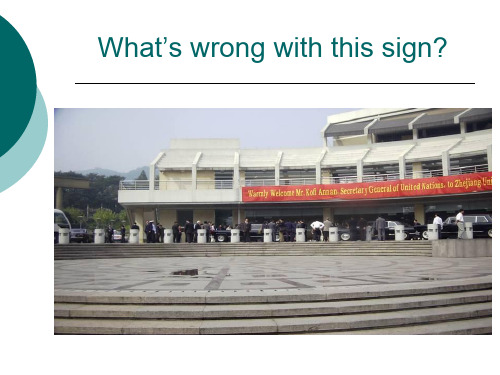
How Did This Happen?
Reliance on old textbooks and dictionaries
Reliance on old translations that are passed down from teacher to student through generations
(from French)
Bad Translations
Bad Translations
Chinese
入口 出口
Chinglish way in way out
English entrance
exit
Bad Translations
Chinese
大厦 勤奋 农民
Chinglish mansion diligent peasant
A warm welcome to Mr. Kofi Annan, the Secretary General of the United Nations Zhejiang University warmly welcomes Mr. Kofi Annan, Secretary General of the United Nations
English center, plaza hardworking/
studious farmer
Are You Still Confused?
Thank you! .... Finish!
Direct Translations
Chinese 豆腐 欢迎你
Chinglish
bean curd
Welcome you to ... Wish you have a ......
中式英语-chinglish

EXAMPLE:
4.在将来的30到50年间,我们在经济上将达到经济发 达国家的水平。
A: in another 30 to 50 years, we shall approach the level of the economically developed countries
B: in another 30 to 50 years, we shall approach the level of the developed countries (通常情况下,“发达国家”已经意味着是经济上发达 的国家,因此,没有必要再加上修饰语。)
4 写作中中式英语的特点:
6.语法错误Syntactic Error
EXAMPLE: 请再给我两小时。 A:Please allow me more two hours. B:Please give me another two hours. 和他结婚以后,她的麻烦就开始了。 A:After marrying him, her trouble began. B:After marrying him, she began to have troubles.
3 中式英语产生的原因:
1.文化差异Cultural difference 自由恋爱 free love free choice of marriage partner
2.不同的思维方式Different thought pattern The Chinese Team won the American Teem. 中国队战胜了美国队 The Chinese team beat the American Team. 中国队打败了美国队.
3.不同的习惯Different habitual usage 东北—northeast 迟早--- sooner or later 中式英语Welcome to use ATM service 正确:Thanks for using this ATM 中式英语Welcome to ride Line 52 Bus 正确: Thank you for riding Bus Line 52.
常见中式英语及纠错

第四词 Surprise
有人可能会说,这个词有什么了不起?选中这个词,完全就看重这个词包含的一种文化。西方人注重生活情调,特别看重带给朋友或家人的“惊喜”。
先看几个句子:
1、我男朋友来看我了。真是个惊喜!
My boyfriend has come to see me. It's really a big surprise!
2、对于这名老教师来说,真是惊喜连连啊。
To this veteran teacher, it's one surprise after another.
这个词荒延谩W魑耍岣咦约旱纳钊の叮投嗟鉺urprise吧!
在中,约有25,100,000项符合surprise的查询结果。
DCEC has attracted favourable attention from analysts,
donors and Botswana's regional neighbours.
顺便再说一句,好的用enjoy,不好的可用suffer。一想到灾难、甚至阿富汗、伊拉克什么的就应该想到suffer这个词。这个词就不单独列出来了。
-----------------------------------------------------------------------------------------
第六词 Offer
这个词比较微妙。英译中时不太好处理,正因如此,这个词才值得我们重视。
先看几个句子:
1、谢谢你的好意,不过我可以走回去。
make a difference.
凡是一样不一样,都可以考虑这2个短语,你用好了,绝对可以make a difference。
中式英语的例句

中式英语中式英语(Chinglish)指带有汉语词汇、语法、表达习惯的英语,是一种具有中国特色的语言。
在使用英语时,因受汉语思维方式或文化的影响而拼造出不符合英语表达习惯的,具有中国特征的英语。
这是中国人在学习英语过程中出现的,是必然的一种语言现象。
随着英语在中国已经成了一个流行的话题,许多新鲜事也跟着出来了。
俄罗斯新闻公布全球语言监听会公布的2005全球最流行的十个词汇清单,chinglish 位列第四位。
中式英语是汉语及英语的英文混合而成的合体字。
学习者在写作中往往先用汉语打腹稿,或列出中文提纲,再把汉语一句句机械地转换成英语,带有明显的汉语痕迹,因而不易被以英语为母语者所接受。
中式英语指带有中文语音、语法、词汇特色的英语,是一种洋泾浜语言。
1. 价格挺合适/挺好的。
Chinglish: The price is very suitable.English: The price is right. / The price is appropriate. / The price is good.提示:suitable(合适的、相配的)最常见的用法是以否定的形式出现在告示或通知中,如:这部影片儿童不宜。
This movie is not suitable for children.2. 你是做什么工作的呢?Chinglish: What’s your job?English: Are you working at the moment?提示:前一种说法的语气显得生硬唐突,因为对方可能目前并未上班。
后一种说法——“目前你是在上班吗?”可以引出你要问的问题:目前你在哪儿工作呢?Where are you working at?/ Where do you work?或者:你从事哪个行业呢?What line of work are you in? / What type of work do you do?最简单的问法当然还是:What do you do?3. 用英语怎么说?Chinglish: How to say?English: How do you say that in English?提示:How to say 不是一个完整的句子,而是引领分句。
- 1、下载文档前请自行甄别文档内容的完整性,平台不提供额外的编辑、内容补充、找答案等附加服务。
- 2、"仅部分预览"的文档,不可在线预览部分如存在完整性等问题,可反馈申请退款(可完整预览的文档不适用该条件!)。
- 3、如文档侵犯您的权益,请联系客服反馈,我们会尽快为您处理(人工客服工作时间:9:00-18:30)。
提示
• 没有一定水平是造不出Chinglish 句子的: 如没有语法错误 • 翻译句子最起码考虑两点: 1. 搭配(包括固定搭配) 2. 语境:如文化差异
Chinglish sentences
• 1. 这个价格对我挺合适的。 误:The price is very suitable for me. 正:The price is right. 提示:suitable(合适的、相配的)最常见的 用法是以否定的形式出现在告示或通知上, 如:下列节目儿童不宜。The following programme is not suitable for children. 这 句话用后面的说法会更合适。
Chinglish sentences
• 3. 用英语怎么说? 误:How to say? 正:How do you say this in English? 提示:How to say是在中国最为泛滥成灾的 中国式英语之一,这绝不是地道的英语说 法。同样的句子有:请问这个词如何拼写? How do you spell that please?请问这个单 词怎么读?How do you pronounce this word?
Chinglish sentences
• 11. 我没有经验。 误:I have no experience. 正:I don't know much about that. 提示:I have no experience这句话听起来 古里古怪,因为您只需要说那方面我懂得 不多,或者这方面我不在行,就行了。I am not really an expert in this area.
Chinglish sentences
• 2. 你是做什么工作的呢? 误:What's your job? 正:Are you working at the moment? 提示:what's your job这种说法难道也有毛病吗? 是的。因为如果您的谈话对象刚刚失业,如此直 接的问法会让对方有失面子,所以您要问:目前 您是在上班吗?Are you working at the moment? 接下来您才问:目前您在哪儿工作呢?Where are you working these days?或者您从事哪个行 业呢?What line of work are you in?
The end
Chinglish sentences
• 3. 用英语怎么说? 误:How to say? 正:How do you say this in English? 提示:How to say是在中国最为泛滥成灾的 中国式英语之一,这绝不是地道的英语说 法。同样的句子有:请问这个词如何拼写? How do you spell that please?请问这个单 词怎么读?How do you pronounce this word?
• 7. 我的舞也跳得不好。 误:I don't dance well too. 正:I am not a very good dancer either. 提示:当我们说不擅长做什么事情的时候, 英语里面通常用not good at something,英 语的思维甚至直nglish sentences
• 8. 现在几点钟了? 误:What time is it now? 正:What time is it, please? 提示:What time is it now是一个直接从汉语翻译 过的句子,讲英语的时候没有必要说now,因为 您不可能问what time was it yesterday, 或者what time is it tommorow?所以符合英语习惯的说法是: 请问现在几点了?还有一种说法是:How are we doing for time?这句话在有时间限制的时候特别合 适。
Chinglish sentences
• 5. 我没有英文名。 误:I haven't English name. 正:I don't have an English name. 提示:许多人讲英语犯这样的错误,从语法角度 来分析,可能是语法功底欠缺,因为have在这里 是实义动词,而并不是在现在完成时里面那个没 有意义的助动词。所以,这句话由肯定句变成否 定句要加助动词。明白道理是一回事,习惯是另 一回事,请您再说几话:我没有钱;I don't have any money.我没有兄弟姐妹;I don't have any brothers or sisters.我没有车。I don't have a car.
Chinglish sentences
• 4. 明天我有事情要做。 误:I have something to do tomorrow. 正:I am tied up all day tomorrow. 提示:用I have something to do来表示您很忙, 这也完全是中国式的说法。因为每时每刻我们都 有事情要做,躺在那里睡大觉也是事情。所以您 可以说我很忙,脱不开身:I'm tied up.还有其他 的说法:I can't make it at that time. I'd love to, but I can't, I have to stay at home.
Chinglish sentences
• 10. 你愿意参加我们的晚会吗? 误:Would you like to join our party on Friday? 正:Would you like to come to our party on Friday night? 提示:join往往是指参加俱乐部或者协会,如: join a health club; join the Communist Party.事实 上,常常与party搭配的动词是come 或者go。如 go a wild party,或者come to a Christmas Party。
Chinglish sentences
• 6. 我想我不行。 误:I think I can't. 正:I don't think I can. 提示:汉语里说“我想我不会”的时候, 英语里面总是说“我不认为我会”。以后 您在说类似的英语句子的时候,只要留心, 也会习惯英语的表达习惯的。
Chinglish sentences
Chinglish sentences
• 9. 我的英语很糟糕。 误:My English is poor. 正:I am not 100% fluent, but at least I am improving. 提示:有人开玩笑说,全中国人最擅长的 一句英文是:My English is poor. 外国人遇 到自己外语不好的情况,他们会说: I am still having a few problem, but I am getting better.
Chinglish sentences
• 12. ——这个春节你回家吗? ——是的,我回去。 --Will you be going back home for the Spring Festival? 误:--Of course! 正:--Sure. / Certainly. 提示:以英语为母语的人使用of course的频率要比中国的 学生低得多,只有在回答一些众所周知的问题时才说of course。因为of course后面隐含的一句话是“我当然知道 啦!难道我是一个傻瓜吗?”因此,of course带有挑衅的 意味。在交谈时,用sure或certainly效果会好得多。同时, of course not也具挑衅的意味。正常情况下语气温和的说 法是certainly not。
Chinglish sentences
• 3. 用英语怎么说? 误:How to say? 正:How do you say this in English? 提示:How to say是在中国最为泛滥成灾的 中国式英语之一,这绝不是地道的英语说 法。同样的句子有:请问这个词如何拼写? How do you spell that please?请问这个单 词怎么读?How do you pronounce this word?
Chinglish sentences
• 3. 用英语怎么说? 误:How to say? 正:How do you say this in English? 提示:How to say是在中国最为泛滥成灾的 中国式英语之一,这绝不是地道的英语说 法。同样的句子有:请问这个词如何拼写? How do you spell that please?请问这个单 词怎么读?How do you pronounce this word?
